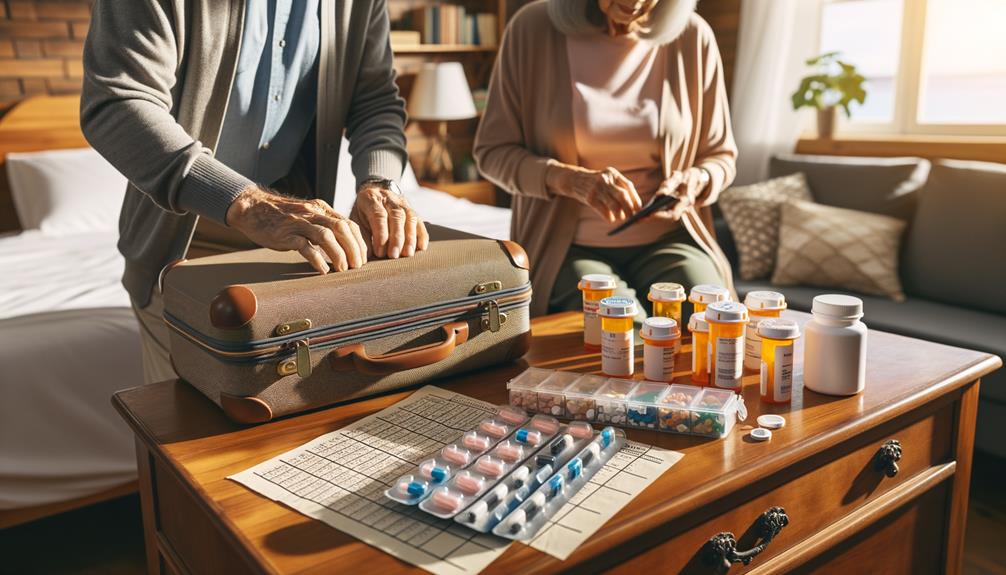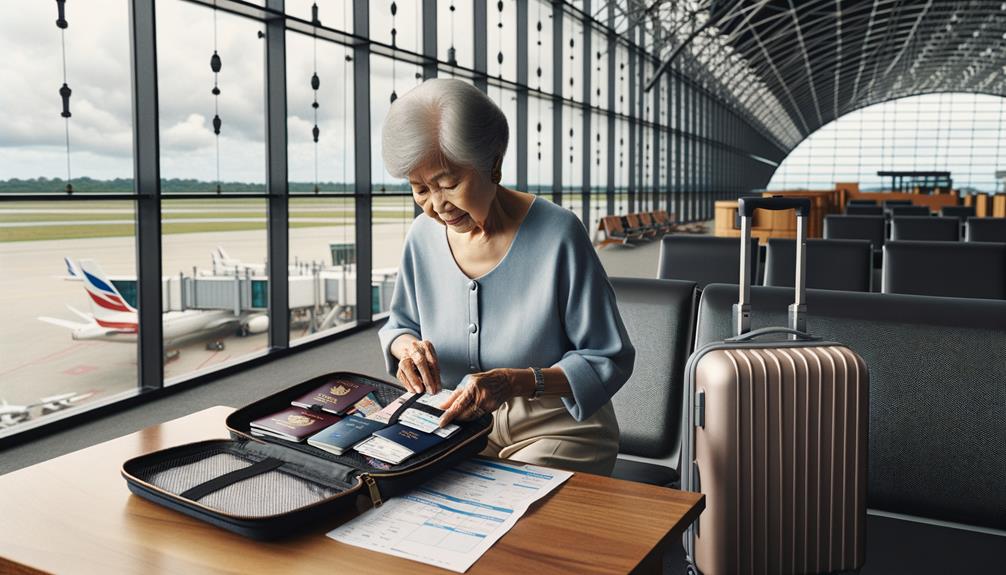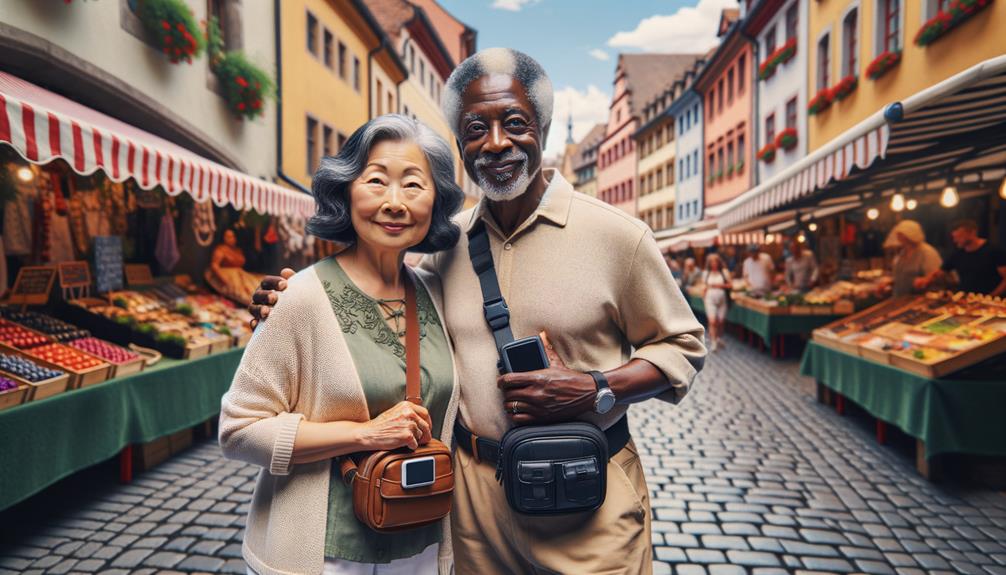Here's how to ensure safe and enjoyable adventures in our later years. Before we start, it's essential to consult our physicians to address any health concerns and get necessary vaccinations. We should also pack an ample supply of medications in our carry-on luggage to avoid missing a dose. To protect our valuables, we must securely store passports and IDs, preferably using an RFID-protected wallet. When booking accommodations, opt for places with accessibility features like elevators and roll-in showers to enhance our comfort. Staying hydrated, pacing ourselves, and safeguarding against theft are crucial. Choosing senior-friendly destinations with flat terrain and nearby medical facilities can greatly impact our travel experience. By following these practical tips, we can enjoy worry-free travel.
Consult Your Physician
Before embarking on any travel plans, seniors should consult their physician to address health concerns and necessary preparations. It's crucial to ensure our loved ones are in good health before starting their journey. Consulting a doctor can help manage chronic conditions effectively while traveling. They can guide us on any necessary medication adjustments, which is vital for maintaining health stability on the road.
Vaccinations play a vital role in safeguarding against illnesses specific to our travel destination. By consulting with our physician, we can receive timely recommendations and vaccinations, ensuring we're protected. Additionally, addressing mobility limitations is another critical aspect. Our doctor can suggest strategies or equipment to ease mobility challenges, making travel more comfortable.
Dietary needs shouldn't be overlooked. A physician can provide advice on maintaining a balanced diet during travel, considering any specific dietary restrictions or health concerns. Furthermore, our doctor can offer insights into emergency protocols and preventive measures for common travel-related issues. This preparation not only guarantees safety but also peace of mind. By seeking medical clearance and guidance, we can help seniors enjoy a smooth, worry-free adventure.
Pack Essential Medications

After consulting our physician, it's crucial to pack an ample supply of essential medications in our carry-on bag to avoid any disruptions during our travels. This is particularly vital for seniors, as having easy access to their medications is key to maintaining their health and ensuring a stress-free journey. By keeping our medication supply in our carry-on luggage instead of checked suitcases, we can prevent potential loss or delays caused by luggage mishandling.
If we're planning an extended trip abroad, it makes sense to obtain a year-long supply of our medications. This prevents any interruptions in treatment and ensures we have what we need without scrambling to find a pharmacy in a foreign country. Most US pharmacies allow prescription transfers, which can be a lifesaver if we need to refill our prescriptions while away from home. It's essential to confirm these details with our pharmacist before leaving.
Keeping our medications easily accessible during travel means we can take them as prescribed without any hassles. By proactively managing our medication supply and storing it safely in our carry-on bag, we can focus on enjoying our trip and experiencing new adventures.
Secure Important Documents

Let's ensure our important documents, like passports and IDs, are both secure and easily accessible. We should keep copies in a safe location and store the originals in an RFID-protected travel wallet. Additionally, sharing digital copies with a trusted contact can be a lifesaver in emergencies.
Passport and ID Safety
Guaranteeing the safety of our passport and ID while traveling is crucial for a stress-free trip. One effective way to safeguard these essential documents is to keep them in a secure, zippered pocket or a hidden pouch. This helps prevent theft and loss, especially in crowded public areas. Additionally, making a copy of documents like our passport and ID and storing them separately can be a lifesaver if the originals are misplaced.
A travel document organizer can be a valuable tool to keep everything in one place. This way, we always know where our documents are, reducing the risk of losing them. When we're not using our passport and ID, storing them in the hotel safe is a smart move. It ensures they're protected and gives us peace of mind.
We also need to exercise caution when sharing personal information or showing our documents in public places. Being discreet protects us from potential identity theft or fraud. Here's a quick guide to help visualize these tips:
| Tip | Description | Benefit |
|---|---|---|
| Secure Pocket | Keep documents in a zippered pocket or hidden pouch | Reduces theft and loss risk |
| Copy of Documents | Store copies separately from originals | Provides backup if originals lost |
| Travel Organizer | Use a document organizer | Keeps documents organized |
Emergency Contact Information
Having a list of emergency contacts with names, phone numbers, and relationships easily accessible is crucial for our safety and peace of mind while traveling. As we age, it's essential to think ahead and prepare for any unexpected situations that may arise during our adventures. Storing important documents like IDs, insurance cards, and medical information in a secure location ensures we have everything we need at our fingertips.
Sharing emergency contact information with a trusted person is also a wise step. This person can be a family member or a close friend who understands our travel plans and health conditions. In case of an emergency, they can provide the necessary support and information to authorities or healthcare providers.
To further ensure our safe travel, we should make copies of essential documents and keep them in separate bags. This adds an extra layer of security in case one set is lost or stolen. Additionally, including contact details for healthcare providers or medical facilities in our travel documents can be lifesaving if we face health issues while away from home. By taking these precautions, we can travel confidently, knowing we're well-prepared for any situation.
Choose Accessible Accommodations

When choosing accommodations, prioritize hotels that offer features like elevators, handrails, and accessible rooms to ensure a comfortable stay for senior travelers. Accessibility is crucial for those with varying physical abilities, and it provides peace of mind for both the travelers and their loved ones. Accessible accommodations often include wheelchair accessible entrances and rooms, which can greatly enhance the travel experience.
When booking, consider the following key factors:
- Elevators and handrails: These are essential for mobility and safety.
- Accessible room features: Wider doorways and roll-in showers make a big difference.
- Senior discounts: Many hotels offer discounts or special amenities for older guests.
- Proximity to attractions and medical facilities: This reduces the need for long commutes.
- Availability of mobility aids: Check if the hotel provides or rents out necessary equipment.
Guard Against Theft

Protecting our belongings while traveling is crucial for a worry-free trip. To minimize the risk of theft, we should start by securing our valuables, such as jewelry and passports, in the hotel safe. This simple step can greatly reduce the risk of losing important items during our travels.
Before we embark on our journey, it's a good idea to inform our banks and credit card companies about our travel plans. This ensures that our accounts remain accessible and any unusual activity can be flagged promptly.
When exploring new destinations, especially in crowded areas and tourist spots, using secure pockets with zippers to store money, ID, and credit cards is vital. These secure pockets make it harder for pickpockets to access our valuables, allowing us to enjoy our surroundings without constant worry.
Additionally, it's a good idea to carry emergency contact information with us at all times. In case of theft or any other emergencies, having this information readily available can expedite assistance and support.
Enjoy Activities Safely

Staying safe and healthy while traveling is crucial for seniors. To ensure we have memorable and enjoyable adventures, we need to prioritize our well-being. Here are some practical senior travel tips to help us stay safe and healthy:
Drink plenty of water to prevent dehydration and maintain energy levels. Before participating in new activities, take a moment to consider the potential risks, such as falls or injuries. Be honest about your physical capabilities and avoid overexertion to prevent accidents. Take your time and set a comfortable pace to fully experience and appreciate your adventures without unnecessary strain. Stay aware of your surroundings to navigate safely and avoid hazards.
Taking regular breaks can help recharge your batteries and reduce the risk of fatigue-related mishaps. By following these guidelines, you can enjoy your travels while staying safe and healthy. Remember, the goal is to savor every moment of your journey.
Select Senior-Friendly Destinations

Choosing senior-friendly destinations ensures enjoyable and accessible travels. When selecting a destination, prioritize places that cater to older travelers' needs. Look for accommodations offering convenient transportation options, ensuring easy mobility around the area. Destinations with flat terrain and wheelchair-friendly facilities make it easier for seniors to navigate without unnecessary strain.
Opting for locations that provide senior discounts on activities and attractions can help save on costs. These destinations recognize the value of catering to an older demographic and provide incentives to make travels more affordable. Access to medical facilities nearby is also crucial; in case of emergencies or health concerns, immediate care should be readily available.
For those who value health and wellness during their travels, seeking out destinations with amenities like health clubs and wellness programs is beneficial. These facilities are tailored to older travelers, providing a range of activities designed to promote well-being.
| Senior-Friendly Features | Description |
|---|---|
| Convenient Transportation | Easy mobility around the area |
| Senior Discounts | Cost-saving on activities and attractions |
| Wheelchair-Friendly Facilities | Flat terrain and accessible accommodations |
| Medical Facilities Nearby | Immediate care in case of emergencies |
| Health Clubs and Wellness Programs | Activities promoting well-being for seniors |
Frequently Asked Questions
Do Senior Citizens Automatically Get TSA Precheck?
Senior citizens don't automatically receive TSA Precheck. They must enroll in the program, undergo a background check, and pay the required fee. However, seniors aged 75 and older do receive some advantages, such as being allowed to keep their shoes on during security screenings.
What Are the TSA Rules for 75 Year Olds?
Seniors can breathe a sigh of relief when going through TSA checkpoints. At 75, you're allowed to keep your shoes and jackets on if you pass through metal detectors. Additionally, laptops can stay in your bag, and TSA PreCheck offers expedited screening. If you need help, don't hesitate to ask.
Is It Safe for an 80 Year Old to Fly?
Flying is generally safe for 80-year-olds if they take necessary precautions. Before booking a flight, it's essential to consult with their healthcare provider to assess any potential health risks. Airlines often offer special services for older passengers, so focusing on comfort, staying hydrated, and moving around during the flight can make a big difference.
Should 70 Year Olds Travel?
Yes, 70-year-olds should travel. With careful planning and necessary precautions, they can have safe and fulfilling adventures. Considering their health, mobility, and personal preferences ensures trips are enriching. Travel provides mental stimulation and valuable social interaction, which can greatly benefit seniors.



